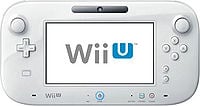Wii U GamePad
The Wii U GamePad is a controller for use with the Wii U console. In addition to standard controller capabilities, the GamePad includes a 6-inch touchscreen in the center. The Wii U GamePad is one of the many controllers that can be used to play Super Smash Bros. for Wii U. The GamePad's near field communication functionality is also required in order to use amiibo figurines with the game.
In addition to its standard usage as a controller, the GamePad's touchscreen is used for other functions in the game. As with many Wii U games, the GamePad can be used for Off-TV Play, where the second screen is used in conjunction with or in place of the TV for displaying the game. This means the entirety of Super Smash Bros. for Wii U can be played on the GamePad if the player desires. the GamePad screen can also be set to display the damage meters during a match instead of simply showing the same image as the TV screen. In Stage Builder, stages can be built by drawing the platforms using the touchscreen. The GamePad can also be used to draw on saved snapshots taken during matches, using a basic built-in painting tool.
Compatibility[edit]
The Wii U GamePad is in a unique situation in it is not only compatible with just the Wii U, but the Wii U cannot function without a GamePad. Severing the two devices is difficult and installing a different GamePad even more so.
In For Wii U, the buttons on the Wii U GamePad can be remapped in the Controls menu to perform other functions.
Standard Controls (Super Smash Bros. for Wii U)[edit]
| Move | |
| Standard attacks | |
| Special moves | |
| Stick-smash | |
| Jump | |
| Grab | |
| Shield | |
| Taunt | |
| Pause | |
| Home Menu | |
| Nothing |
Technical data[edit]
Input lag[edit]
The Wii U GamePad has latency comparable to a WaveBird controller, experiencing lows of 71.2ms (4.1 frames) and highs of 84.53ms (5.1 frames). It is more consistent by comparison, as the WaveBird often experiences higher latency in worse situations, being as high as 92.86ms (5.5 frames).
Touch screen[edit]
The center of the GamePad houses a 6.2-inch LCD resistive touchscreen. This screen outputs video at a maximum of 720p and 30 frames per second, and is responsive to any pressure on the screen. The screen, like the rest of the console, receives and sends data to and from the Wii U through a proprietary low frequency Wi-Fi connection.
Near field communication[edit]
At the bottom-left corner of the GamePad is a special chip that can send and receive data from other compatible chips from a distance of up to 4 centimeters. With relevance to the Smash series, this includes all compatible amiibo figures and their corresponding features within the game.
In competitive play[edit]
Although the Wii U GamePad is technically seen in most Super Smash Bros. for Wii U tournaments due to it being needed for most of the console's functions (such as creating Miis in Mii Maker, and for side events involving amiibo), the controller is almost never used by serious players and it is generally banned for use at tournaments. Aside from the GamePad's large and bulky build turning off most people from using it over other controller options, only one GamePad can by synced to a Wii U at a time, rendering it impossible for two or more players to use one on the same setup. This means if two or more GamePad users were to face off in a match, it would force the need to somehow resolve who gets to use the GamePad if none of the players are willing to concede using it, with no fair way of doing so. Additionally, an already synced GamePad cannot be unsynced without forcefully severing the connection by moving the GamePad far enough away or draining its battery, and the game would also have to be closed to resync a new GamePad, meaning GamePad users cannot switch to other setups without a complicated and time-consuming process, a fundamental requirement for a smooth tournament experience. Simply allowing players to use a GamePad already synced to the console would theoretically address this issue, but due to the GamePads being expensive and hard-to-replace, those who bring their setups to tournaments are generally unwilling to let other players use their GamePads, while the GamePad users are also liable to find another person's GamePad to be in suboptimal condition.
| Controllers and buttons | |
|---|---|
| Nintendo 64 controller | |
| GameCube controller | |
| Wii Remote (and Nunchuk) | |
| Classic Controller | L |
| Nintendo 3DS | |
| Wii U GamePad / Pro Controller | L |
| Joy-Con | |
| Switch Pro Controller | L |
| Third-party controllers | Hori Mini Pad · Arcade controller · Keyboard |
| Other | Controller modification |

